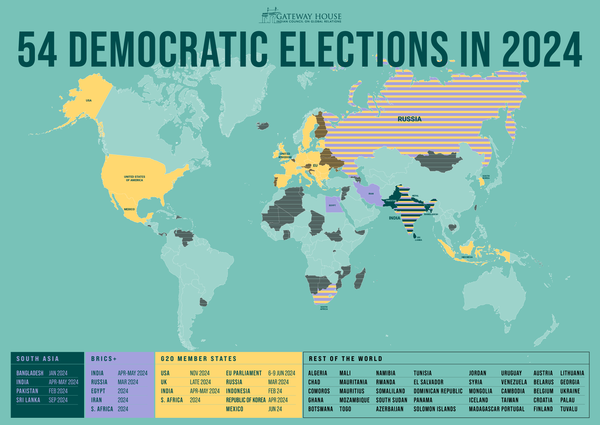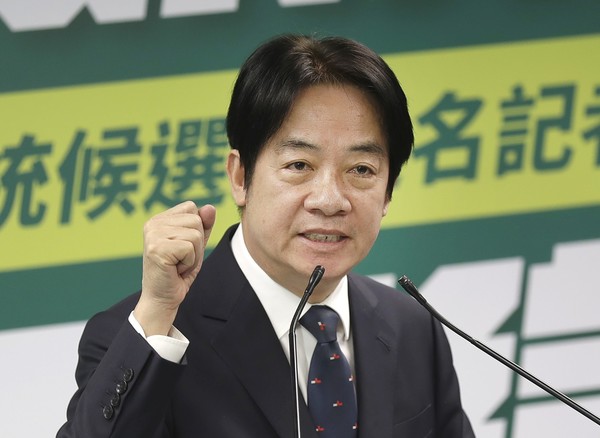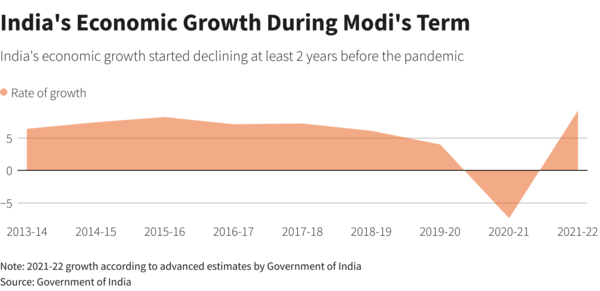The year 2024 is being hailed as the ‘Year of Elections’ by international political experts, with a staggering number of elections set to take place. A total of 50 countries worldwide will hold national elections, with the number of eligible voters reaching 41% of the global population. Among these are key elections in Taiwan, a focal point in the US-China power struggle, as well as war-torn Russia and Ukraine and not to mention the all-important US presidential election. Let’s delve into the crucial election issues that simply cannot be overlooked in the international political landscape of 2024.

1. January, Taiwan’s Presidential Election: China vs. U.S Proxy War
On January 13, 2024, Taiwan held its presidential election and 11th legislative election. This election is particularly noteworthy among international political experts, as it is expected to be a variable in the geopolitical conflict in the South China Sea and the proxy war for supremacy between the US and China. The US and China have focused on their relations with Taiwan for different reasons. For China, Taiwan is seen as a foothold for its expansion into the Pacific, while for the US, Taiwan is a strategic point to contain China and prevent the spread of its dominance. The precarious cross-strait relations have worsened since 2020. This is because Tsai Ing-wen, who was inaugurated in 2016, and the Democratic Progressive Party (DPP) have strongly asserted Taiwan’s status as a sovereign state over the past eight years, showing a hostile attitude towards China as well as pursuing a friendly attitude and strengthened relations with the US. When Russia invaded Ukraine, tensions also heightened over whether China would execute its Taiwan integration plans.

With a clear focus on the escalating importance of Taiwan’s leadership role, the election results were as follows. The Central Election Commission of Taiwan announced that the DPP’s candidate, Lai, received 40.05% of the vote, leading to the re-election of the US-friendly DPP. This suggests that cross-strait relations are likely to become more tense. Meanwhile, Lai emphasized peace and stability in the Taiwan Strait at a press conference immediately after his election. He pledged to maintain the ‘status quo across the Strait’, neither seeking independence nor unification with China, and to ‘protect Taiwan from the threat of China’. In response, Rex Li[1], a professor at the School of Global Affairs at King’s College London, expressed his opinion that “the relative peace in the Taiwan Strait is likely to continue in the next few months and possibly years, which will be punctuated by tensions and crises. This is a volatile situation but unless and until the Chinese and Taiwanese leaders are able to find a satisfactory solution to the intractable problem, maintaining the status quo across the Taiwan Strait is probably the best we can hope for.”
2. March, Presidential Elections in Russia and Ukraine
In the midst of a three-year war, Russia and Ukraine are set to hold presidential elections on March 17 and 31, respectively. Russian President Putin, who has been in power for 24 years, is running for his fifth term as an independent. A week after formalizing his candidacy on December 14, Putin held a four-hour press conference where he emphatically stated, "There will be peace when we achieve our goals, the ones you just mentioned. Now, let's return to these goals. They have not changed. I'll remind you of what we talked about: the denazification of Ukraine, its demilitarization, its neutral status," indicating his intention to continue the war in Ukraine until his objectives are met. Despite the ongoing war, Putin is actively traveling all over Russia to meet with voters. He currently enjoys high approval ratings within Russia. According to a poll by Russia's non-governmental research organization, the Levada Center, as of December 2023, Putin's approval rating among Russian citizens is 83%, and support for the war in Ukraine is also at 76%. In light of this, Dr. Alexandar Hill[2], a Military History professor at the University of Calgary, opined in The Conversation that Putin's fifth term success is almost certain, stating, "Palatable or not in the West, Russia’s ability to seemingly resist sanctions and fight off a Ukrainian NATO-backed counteroffensive has contributed to rising public support for the war and for Putin."
In contrast, it is uncertain whether elections will be held in Ukraine. The term of Ukrainian President Zelensky is until May this year, and in principle, the presidential election should be held on March 31. However, Ukraine has been under martial law since February 2022, and under the Ukrainian constitution, elections cannot be held during martial law. In addition, Zelensky requested an extension of martial law to the parliament last November, saying that it is not an appropriate time for elections. 80% of Ukrainians also opposed holding elections before the end of the war, considering the many refugees who have left Ukraine and the destroyed voting facilities. However, the negative view of Ukraine’s support from the US Republican Party and the negative evaluation of Zelensky in the international community due to the deadlock of the war are widespread. And they could be obstacles to the postponement of the election, which guarantees Zelensky’s ‘inevitable’ term extension. On the other hand, President Zelensky expressed his will to run for re-election last August, saying that he would not abandon his homeland, and his approval rating among Ukrainians is also very high, exceeding 81% according to a Gallup poll last year.
3. Nov, Russia-Ukraine War Extenstion: U.S Presidential Elections
Given the high approval ratings of the leaders in both Russia and Ukraine, which are currently at war, it is anticipated that the 2024 presidential elections will not result in a change in the highest echelons of power in either country. However, the issue of the Russia-Ukraine war is likely to have a strong interaction with the issue of the U.S. presidential election. This is because the question of whether to expand or reduce support for Ukraine is creating a tense standoff between the Democratic Party, represented by Biden, and the Republican Party, represented by Trump. The U.S. presidential election is also scheduled for November this year, and the current U.S. Congress is heatedly gearing up for a rematch between President Biden and former President Trump. President Trump has been very skeptical about the Biden administration's continuous support for Ukraine, which is in a stalemate, and has even stated that if he becomes president, he will end the Russo-Ukrainian war in a day. The continuity of U.S. support for Ukraine is a crucial variable in the increasingly complex political war between the Republicans and Democrats, along with external issues such as the Israel-Hamas war, the power struggle with China and domestic U.S. issues such as abortion and immigration. At the same time, whether Biden or Trump becomes the next president in the U.S. election in November will greatly influence the continuation of the Russo-Ukrainian war.
4. April, India Prime Minister Election: Will Mori Win a Third Consecutive Term?

In April, India is set to hold its general elections. Narendra Modi, the Prime Minister of India, is vying for his third term. Since taking office as the 14th Prime Minister in 2014, he has pursued the 'Make in India' economic policy, aiming to develop India as the 'factory of the world'. As a result, India's economic growth rate has remained at 7.23% for four years after his inauguration, and the production value of the manufacturing industry has also grown by nearly 40% compared to before his inauguration in 2013. Although the worst GDP growth rate of -6.6% was recorded in 2020 due to the pandemic, the GDP growth rate has achieved a high growth rate of 8.7% since the pandemic began to end in 2021. Despite such high economic growth, there is also considerable public criticism of Prime Minister Modi. This is due to his poor handling of the COVID situation and his exacerbation of ethnic and religious conflicts and Hindu nationalism in India. During Modi's tenure, a far-right Hindu force has taken power in Indian politics, leading to intensified conflicts with other minority religions in India, especially Islam. Nevertheless, the Indian People's Party (BJP), led by Prime Minister Modi, won a landslide victory in the local elections held on December 3 last year, and it is widely believed that Prime Minister Modi will win in this year's general elections. According to a survey by Morning Consult, a public opinion research organization, on December 9, 2023, he received a 76% approval rating. However, some in the international community strongly fear that Modi's re-election will lead to a decline in Indian democracy. Maya Tudor[3], an associate professor of political science and public policy at the Blavatnik School of Government under Oxford University, strongly criticized the Modi cabinet, saying, "No country is a better exemplar of our global democratic recession than India.…The Modi government has increasingly employed two kinds of laws to silence its critics—colonial-era sedition laws and the Unlawful Activities Prevention Act (UAPA)." Thus, the success of Modi's third term is seen as a double-edged sword in terms of the sustainability of India's economic growth and the decline of democracy.
As we examine the major election issues of 2024, it becomes clear that domestic and foreign politics are inextricably linked. The interplay between the Taiwan elections, a variable for peace across East Asia, the Russia-Ukraine war, and the U.S. elections, illustrates how elections in the era of globalization are distinctly different from the past where election politics were confined to domestic spheres. Thus, focusing on the elections taking place in various countries in 2024 is essential for understanding the international political climate.

